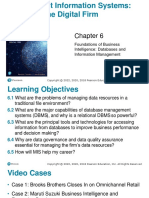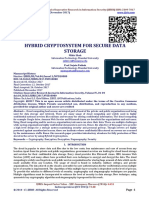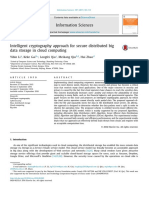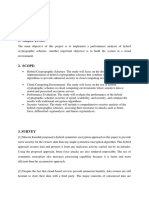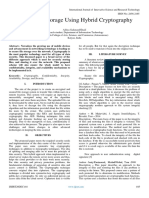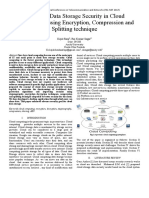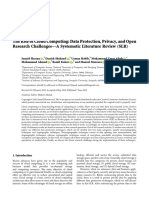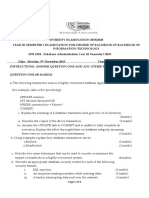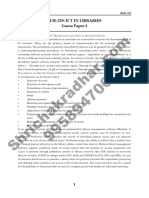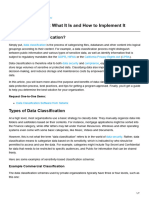0 ratings0% found this document useful (0 votes)
13 viewsFin Irjmets1656149629
Fin Irjmets1656149629
Uploaded by
rosemaryjibrilThe document discusses secure file storage on cloud using hybrid cryptography. It proposes using AES, DES and RSA encryption algorithms together for encrypting file slices. The hybrid approach makes the remote server more secure and helps cloud providers gain user trust by fulfilling security and privacy requirements.
Copyright:
© All Rights Reserved
Available Formats
Download as PDF, TXT or read online from Scribd
Fin Irjmets1656149629
Fin Irjmets1656149629
Uploaded by
rosemaryjibril0 ratings0% found this document useful (0 votes)
13 views4 pagesThe document discusses secure file storage on cloud using hybrid cryptography. It proposes using AES, DES and RSA encryption algorithms together for encrypting file slices. The hybrid approach makes the remote server more secure and helps cloud providers gain user trust by fulfilling security and privacy requirements.
Original Title
fin_irjmets1656149629
Copyright
© © All Rights Reserved
Available Formats
PDF, TXT or read online from Scribd
Share this document
Did you find this document useful?
Is this content inappropriate?
The document discusses secure file storage on cloud using hybrid cryptography. It proposes using AES, DES and RSA encryption algorithms together for encrypting file slices. The hybrid approach makes the remote server more secure and helps cloud providers gain user trust by fulfilling security and privacy requirements.
Copyright:
© All Rights Reserved
Available Formats
Download as PDF, TXT or read online from Scribd
Download as pdf or txt
0 ratings0% found this document useful (0 votes)
13 views4 pagesFin Irjmets1656149629
Fin Irjmets1656149629
Uploaded by
rosemaryjibrilThe document discusses secure file storage on cloud using hybrid cryptography. It proposes using AES, DES and RSA encryption algorithms together for encrypting file slices. The hybrid approach makes the remote server more secure and helps cloud providers gain user trust by fulfilling security and privacy requirements.
Copyright:
© All Rights Reserved
Available Formats
Download as PDF, TXT or read online from Scribd
Download as pdf or txt
You are on page 1of 4
e-ISSN: 2582-5208
International Research Journal of Modernization in Engineering Technology and Science
( Peer-Reviewed, Open Access, Fully Refereed International Journal )
Volume:04/Issue:06/June-2022 Impact Factor- 6.752 www.irjmets.com
SURVEY ON SECURE FILE STORAGE ON CLOUD USING
HYBRID CRYPTOGRAPHY
Pankaj Balu Regade*1, Ajinkya Ashok Patil*2, Shubham Sambhaji Koli*3,
Rahul Balu Gokavi*4, Prof. M.S. Bhandigare*5
*1,2,3,4,5Student,
Department Of Computer Science And Engineering, Sant Gajanan Maharaja
College Of Engineering, Mahagaon, Gadhinglaj, Maharashtra, India.
ABSTRACT
Now a day's cloud computing is used in many areas like industry, military, colleges etc to storing huge amount
of data. We can retrieve data from cloud on request of user. To store data on cloud we have to face many issues.
To provide the solution to these issues there are n number of ways. The proposed model is liable to meet the
required security needs of data center of cloud. AES, DES and RSA are used for the encryption of file slices takes
minimum time and has maximum throughput for encryption and decryption from other symmetric algorithms.
The idea of splitting and merging adds on to meet the principle of data security. The hybrid approach when
deployed in cloud environment makes the remote server more secure and thus, helps the cloud providers to
fetch more trust of their users. For data security and privacy protection issues, the fundamental challenge of
separation of sensitive data and access control is fulfilled. Cryptography technique translates original data into
unreadable form. Cryptography technique is divided into symmetric key cryptography and public key
cryptography. This technique uses keys for translate data into unreadable form. So only authorized person can
access data from cloud server.
Keywords: Cloud Storage, Hybrid Cryptography, Security.
I. INTRODUCTION
Cloud computing is defined as for enabling suitable, on demand network entrance to a shared pool of
configurable calculating resources. Cloud computing everything is delivered as a service, there are three main
service models used in the cloud namely: Platform as a Service Software as a Service Infrastructure as a
service a) Security issues : Cloud as a method of providing computing resources has many challenges based on
design issues which affect the efficiency, security and performance of the entire system, these challenges could
be: Data Storage: Cloud storage providers manage the data in multiple copies across many independent
locations Cloud Confidentiality: Confidentiality can be defined as the sensitive data not being disclosed to
unauthorized process, devices and person. A cloud service provider knows where the user’s public or private
data is located and who can/cannot access the data. Data Integrity: Data Integrity is defined as the rightness of
data stored in the cloud. The alterations between two updates of a record violate the data integrity. Data
Security: In the traditional file systems data was stored within boundaries, but cloud data is stored outside the
boundaries of an organization, say, and third party storage using strong encryption techniques.
To resolve the above listed challenges, cryptography can provide solutions such as reassuring the
receiver/recipient that the message received has not been tampered with or altered – this can be defined as
Integrity Checking. This can be achieved by generating a legitimate source and authentication. Securing the
database can be a means of securing the cloud. This can be achieved using different encryption/decryption
algorithms which are classified as follows:
II. METHODOLOGY
A. Problem Experiment Work
In above papers mentioned, we are going to learn about various algorithms which is used for encryption. Here,
we will use the same methods for our model. This paper gives a comparative view of different encryption
algorithms on parameters like CPU usage, encryption time, ROM utilization, throughput with different file sizes,
and length of packet and data type.
1) Rivest - Shamir- Adleman (RSA)
It is a public cryptosystem technique that incorporates block size encryption and variable key size. The steps
involved are i generate two distinct prime numbers. ii. Calculate t as product of two. iii. Now compute phi (t). iv.
www.irjmets.com @International Research Journal of Modernization in Engineering, Technology and Science
[3781]
e-ISSN: 2582-5208
International Research Journal of Modernization in Engineering Technology and Science
( Peer-Reviewed, Open Access, Fully Refereed International Journal )
Volume:04/Issue:06/June-2022 Impact Factor- 6.752 www.irjmets.com
Find d such that d*e = 1 v. Public Key is (1, e) and Private key is (1, d). Its most apparent disadvantage is if two
numbers are of massive length then it takes more time and, they should be of comparable size.
2) Data Encryption Standard (DES)
This encrypt algorithm is the most widely used because it works on bits. It is a block cipher incorporating
fiestel structure. Length of message at one time to be encrypted is 64 bits and the key size of 64-bits but every
7x bit is a check bit which is removed in making of sub-keys. The steps involved arei. Cut the plain text in two
parts left and right. ii. Design 16 sub keys 48 bits long each. iii. Code words are written for each 64-bit block of
data. As known, it is one of the best algorithms because no such possible attack is known to crack it other than
brute-force which is costly and time consuming.
3) Advanced Encryption Standard (AES)
AES also known as Rijndael structure is an iterative algorithm rather being called a fiestel structure. It also a
block cipher has block capacity of 128 bits and key size any of 128, 192 or 256 bits. It is iterative because it uses
rounds to convert data to cipher text depending on key sizes.
Figure 1: Flow Chart
www.irjmets.com @International Research Journal of Modernization in Engineering, Technology and Science
[3782]
e-ISSN: 2582-5208
International Research Journal of Modernization in Engineering Technology and Science
( Peer-Reviewed, Open Access, Fully Refereed International Journal )
Volume:04/Issue:06/June-2022 Impact Factor- 6.752 www.irjmets.com
Figure 2: System Architecture
III. RESULTS AND DISCUSSION
The stored image file is completely secured as the file is being encrypted not by just using one but three
encryption algorithm which is AES, DES, RSA. Data is kept secured on cloud server which avoids unauthorized
access. Requires an active internet connection to connect with cloud server. Data security is a major priority.
This system can be implemented into banking and corporate sectors to securely transfer confidential data. It is
not possible to develop a system that makes all the requirements of the user. User requirements keep changing
as the system is being used. Some of the future enhancements that can be done to this system are:-As the
technology emerges, it is possible to upgrade the system and can be adaptable to desired environment. Based
on the future security issues, security can be improved using emerging technologies like single sign-on.
IV. CONCLUSION
The main goal is to securely store and access data in cloud that is not controlled by the owner of the data. We
exploit the technique hybrid cryptography encryption to protect data files in the cloud. Two part of the cloud
server improved the performance during storage and accessing of data. The hybrid Encryption algorithm used
for encryption is another advantage to improve the performance during encryption and decryption process. We
assume that this way of storing and accessing data is much secure and have high performance. Our efforts are
going on to solve the problem of group sharing of data in the shared data section as in this scheme only member
of group can access the data stored over shared data section. One to many, many to one, many to many
communication is not possible.
V. REFERENCES
[1] B.Swathi, 2 Sri .Dr. Bhaludra Raveendranadh Singh,”Secure File Storage In Cloud Computing Using
Hybrid Cryptography Algorithm,”Volume no.06, Issue No.11,November 2017.
[2] Atanu Basu, Indranil Sengupta,” Secure Cloud Storage Scheme Based On Hybrid Cryptosystem”.
[3] Swarna C#1, Marrynal S. Eastaff*2, “Secure File Storage in Cloud Computing Using Hybrid
Cryptography Algorithm,” VOLUME 5, ISSUE 3, MAR/2018.
[4] Fortine Mata, Michael Kimwele2, George Okeyo3,” Enhanced Secure Data Storage in Cloud Computing
Using Hybrid Cryptographic Techniques (AES and Blowfish),”Volume no.6,Issue no.3,March 2017.
[5] Jitendra Singh Adam et al.," Modified RSA Public Key Cryptosystem Using Short Range Natural Number
Algorithm", International Journal of Advanced Research in Computer Science and Software
www.irjmets.com @International Research Journal of Modernization in Engineering, Technology and Science
[3783]
e-ISSN: 2582-5208
International Research Journal of Modernization in Engineering Technology and Science
( Peer-Reviewed, Open Access, Fully Refereed International Journal )
Volume:04/Issue:06/June-2022 Impact Factor- 6.752 www.irjmets.com
Engineering, vol. 2,Aug. 2012.
[6] Manikandan.G et al., "A changed cryptographic plan improving information", Journal of Theoretical and
Applied Information Technology, vol. 35, no.2, Jan. 2012.
[7] Niles Maintain and Subhead Bhingarkar, "The examination and Judgment of Nimbus, Open Nebula and
Eucalyptus", International Journal of Computational Biology, vol. 3, issue 1, pp 44-47, 2012.
[8] Srinivasarao D et al., "Breaking down the Superlative symmetric Cryptosystem Encryption Algorithm",
Journal of Global Research in Computer Science, vol. 7, Jul. 2011.
[9] Achill Buhl, "Rising Security Challenges in Cloud Computing", in Proc. of World Congress on
Information and correspondence Technologies ,pp. 217-222, Dec. 2011.
[10] Tingyuan Nye and Tang Zhang "An investigation of DES and Blowfish encryption algorithm‟, in Proc.
IEEE Region 10 Conference, pp. 1-4 ,Jan. 2009. [11]Peter Mel and Tim Grace, "The NIST Definition of
Cloud Computing", NIST, 2010.
www.irjmets.com @International Research Journal of Modernization in Engineering, Technology and Science
[3784]
You might also like
- Laudon Mis17 PPT Ch06Document46 pagesLaudon Mis17 PPT Ch06arihessaNo ratings yet
- Hybrid Cryptosystem For Secure Data StorageDocument4 pagesHybrid Cryptosystem For Secure Data StorageIJIRIS - INTERNATIONAL JOURNAL OF INNOVATIVE RESEARCH IN INFORMATION SECURITYNo ratings yet
- Secure Cloud Storage Using Different Algorithms in CryptographyDocument10 pagesSecure Cloud Storage Using Different Algorithms in CryptographyIJRASETPublicationsNo ratings yet
- Secure File Storage On Cloud Computing Using Cryptographic AlgorithmDocument7 pagesSecure File Storage On Cloud Computing Using Cryptographic AlgorithmIJRASETPublicationsNo ratings yet
- Repository and Retrieval of Data Using AES Security in Cloud Computing EnvironmentDocument8 pagesRepository and Retrieval of Data Using AES Security in Cloud Computing EnvironmentIJRASETPublicationsNo ratings yet
- IJAS_Volume 12_Issue 2_Pages 5359-5364Document6 pagesIJAS_Volume 12_Issue 2_Pages 5359-5364aman.beheraNo ratings yet
- Enhanced Secure Data Sharing Over Cloud Using ABE AlgorithmDocument4 pagesEnhanced Secure Data Sharing Over Cloud Using ABE Algorithmcyan whiteNo ratings yet
- A Secure Data Self Destructing Scheme in Cloud ComputingDocument5 pagesA Secure Data Self Destructing Scheme in Cloud ComputingIJSTENo ratings yet
- A Secure and Managed Cloud Storage System Using Encryption With Machine Learning ApproachDocument15 pagesA Secure and Managed Cloud Storage System Using Encryption With Machine Learning ApproachGlobal Research and Development ServicesNo ratings yet
- File Storage On Cloud Using CryptographyDocument6 pagesFile Storage On Cloud Using CryptographyIJRASETPublicationsNo ratings yet
- Paper 5861Document12 pagesPaper 5861rosemaryjibrilNo ratings yet
- Intelligent Cryptography PaperDocument13 pagesIntelligent Cryptography PaperManisai KesarlaNo ratings yet
- Efficient Secure Ranked Keyword Search Algorithms Over Outsource Cloud DataDocument5 pagesEfficient Secure Ranked Keyword Search Algorithms Over Outsource Cloud DataInternational Journal of Application or Innovation in Engineering & ManagementNo ratings yet
- Detecting Replicated Files in The CloudDocument9 pagesDetecting Replicated Files in The CloudIJRASETPublicationsNo ratings yet
- Safeguarding Cloud by Increasing Confidentiality Conservation and User Built Access Controller MechanismDocument13 pagesSafeguarding Cloud by Increasing Confidentiality Conservation and User Built Access Controller MechanismArvind Bhagat PatilNo ratings yet
- Improving Database Security in Cloud Computing by Fragmentation of DataDocument7 pagesImproving Database Security in Cloud Computing by Fragmentation of DataMadhuri M SNo ratings yet
- Adnan-2019-Big Data Security in The Web-Based PDFDocument13 pagesAdnan-2019-Big Data Security in The Web-Based PDFArmando Rafael Fonseca ZuritaNo ratings yet
- Ensuring Data Security in Cloud StorageDocument5 pagesEnsuring Data Security in Cloud StorageAbdullah Jaafar100% (1)
- VHDL Implementation of 128 Bit Pipelined Blowfish AlgorithmDocument5 pagesVHDL Implementation of 128 Bit Pipelined Blowfish AlgorithmAnonymous lPvvgiQjRNo ratings yet
- Cloud Based Secure File Storage Using Hybrid Cryptography AlgorithmsDocument7 pagesCloud Based Secure File Storage Using Hybrid Cryptography AlgorithmsNaresh KumarNo ratings yet
- Report - FINAL CSDocument79 pagesReport - FINAL CSvaayugudNo ratings yet
- Base paper4Document12 pagesBase paper4divyad8809No ratings yet
- An Efficient Secure Key-Aggregation SchemeDocument6 pagesAn Efficient Secure Key-Aggregation SchemeTucha KedirNo ratings yet
- Key-Aggregate Cryptosystem For Scalable Data Sharing in Cloud Storage-A ReviewDocument5 pagesKey-Aggregate Cryptosystem For Scalable Data Sharing in Cloud Storage-A ReviewSiddhartha BashettyNo ratings yet
- Fin Irjmets1652773535Document5 pagesFin Irjmets1652773535S. Anthony jejan Melvin RajNo ratings yet
- Privacy Preserving of Data Files & Audio / Video Encryption - Decryption Using AES AlgorithmDocument5 pagesPrivacy Preserving of Data Files & Audio / Video Encryption - Decryption Using AES AlgorithmAnonymous lPvvgiQjR100% (1)
- International Journal of Computer Engineering and ApplicationsDocument7 pagesInternational Journal of Computer Engineering and ApplicationsrishithaNo ratings yet
- Securing Storage Data in Cloud Using RC5 Algorithm: Jay Singh, Brajesh Kumar, Asha KhatriDocument5 pagesSecuring Storage Data in Cloud Using RC5 Algorithm: Jay Singh, Brajesh Kumar, Asha KhatriKabilan KabilNo ratings yet
- Secure File Storage On Cloud Using CryptographyDocument13 pagesSecure File Storage On Cloud Using CryptographyIJRASETPublicationsNo ratings yet
- A New Approach For Providing The Data Security and Secure Data Transfer in Cloud ComputingDocument6 pagesA New Approach For Providing The Data Security and Secure Data Transfer in Cloud ComputingseventhsensegroupNo ratings yet
- (IJCST-V5I2P61) :irene Getzi SDocument5 pages(IJCST-V5I2P61) :irene Getzi SEighthSenseGroupNo ratings yet
- Anonymous Data Sharing Scheme For Dynamic Groups in An Untrusted CloudDocument7 pagesAnonymous Data Sharing Scheme For Dynamic Groups in An Untrusted CloudInternational Journal of Application or Innovation in Engineering & ManagementNo ratings yet
- Design and Implementation of Security Management Using Data Encryption and Decryption Techniquesfjo1nr4mfDocument12 pagesDesign and Implementation of Security Management Using Data Encryption and Decryption Techniquesfjo1nr4mfjamessabraham2100% (1)
- Secure Data Sharing and Search For Cloud Edge CollaborativeDocument5 pagesSecure Data Sharing and Search For Cloud Edge CollaborativeIJRASETPublicationsNo ratings yet
- .Cryptography in Cloud Computing A Basic Approach To Ensure Security in Cloud PDFDocument4 pages.Cryptography in Cloud Computing A Basic Approach To Ensure Security in Cloud PDFHaimy mathaiNo ratings yet
- Secure File Storage On Cloud Using Hybrid CryptographyDocument5 pagesSecure File Storage On Cloud Using Hybrid CryptographyIJAR JOURNALNo ratings yet
- Securing Storage Data in Cloud Using RC5 AlgorithmDocument5 pagesSecuring Storage Data in Cloud Using RC5 AlgorithmVladimirMykhailivNo ratings yet
- StoreSim Optimizing Information Leakage in Multi-Cloud Storage ServicesDocument6 pagesStoreSim Optimizing Information Leakage in Multi-Cloud Storage ServicesIJRASETPublicationsNo ratings yet
- Khalid Ali's conference paper(IEEE-iCoMET48670.2020.9073930)Document5 pagesKhalid Ali's conference paper(IEEE-iCoMET48670.2020.9073930)khaliduitNo ratings yet
- A Secure FEC-Based Cloud Storage System With Proxy Re-Encryption SchemeDocument5 pagesA Secure FEC-Based Cloud Storage System With Proxy Re-Encryption SchemeseventhsensegroupNo ratings yet
- Data Storage Security in Cloud Computing Using AES Algorithm and MD5 AlgorithmDocument6 pagesData Storage Security in Cloud Computing Using AES Algorithm and MD5 AlgorithmIJRASETPublicationsNo ratings yet
- Soteria: B.Tech Mid Semester Report On Core ProjectDocument10 pagesSoteria: B.Tech Mid Semester Report On Core ProjectThe flash GuyNo ratings yet
- (IJCST-V4I4P12) :Sonam.K.Darda, Prof. (MRS) .Manasi.K.KulkarniDocument6 pages(IJCST-V4I4P12) :Sonam.K.Darda, Prof. (MRS) .Manasi.K.KulkarniEighthSenseGroupNo ratings yet
- Decentralized Cloud Storage Using BlockchainDocument9 pagesDecentralized Cloud Storage Using BlockchainIJRASETPublicationsNo ratings yet
- Accessing Secured Data in Cloud Computing EnvironmentDocument10 pagesAccessing Secured Data in Cloud Computing EnvironmentAIRCC - IJNSANo ratings yet
- Privacy Preserving Ranked Keyword Search Over Cloud ComputingDocument4 pagesPrivacy Preserving Ranked Keyword Search Over Cloud ComputingAmmu Tanu Ammu TanuNo ratings yet
- Review On Network Security and CryptograDocument5 pagesReview On Network Security and Cryptogramaximeboi489No ratings yet
- Data Privacy Using Multi-Keyword Search and Coordinate Matching Over Encrypted DocumentsDocument7 pagesData Privacy Using Multi-Keyword Search and Coordinate Matching Over Encrypted DocumentsIJRASETPublicationsNo ratings yet
- Secure File Storage Using Hybrid CryptographyDocument4 pagesSecure File Storage Using Hybrid CryptographyInternational Journal of Innovative Science and Research TechnologyNo ratings yet
- Data Security in Cloud Using Key Aggregate Cryptosystem: I J I R C C EDocument17 pagesData Security in Cloud Using Key Aggregate Cryptosystem: I J I R C C EAnonymous etpj6GNo ratings yet
- Final Report ChaptersDocument56 pagesFinal Report ChaptersJai Deep PonnamNo ratings yet
- Enhanced Rsa Ersa An Advanced Mechanism For Improving The Security - 2023 - Tech Science PressDocument13 pagesEnhanced Rsa Ersa An Advanced Mechanism For Improving The Security - 2023 - Tech Science PressEminetou Didi Abd Errezagh Eminetou Didi Abd ErrezaghNo ratings yet
- Data Storage SecurityDocument5 pagesData Storage SecurityAaPka ApNa MaNaSNo ratings yet
- Hybrid Encryption For Cloud Database Security-AnnotatedDocument7 pagesHybrid Encryption For Cloud Database Security-AnnotatedClaireNo ratings yet
- Review Paper On - Secure Group Sharing Model For Public Cloud Computing-IJAERDV04I0270120Document4 pagesReview Paper On - Secure Group Sharing Model For Public Cloud Computing-IJAERDV04I0270120Editor IJAERDNo ratings yet
- Cin2022 8303504Document26 pagesCin2022 8303504maliani adolphNo ratings yet
- SSRN Id4209511Document8 pagesSSRN Id4209511shraddha gholapNo ratings yet
- Time Complexity Analysis of Rsa and Ecc Based Security Algorithms in Cloud DataDocument8 pagesTime Complexity Analysis of Rsa and Ecc Based Security Algorithms in Cloud DataSia BoualemNo ratings yet
- Computer 8Document15 pagesComputer 8Nebras AliNo ratings yet
- Secure File Storage On Cloud Using Hybrid CryptogrDocument18 pagesSecure File Storage On Cloud Using Hybrid Cryptogrharsh raj chikkuNo ratings yet
- A Students Attendance System Using QR CodeDocument6 pagesA Students Attendance System Using QR CoderosemaryjibrilNo ratings yet
- 2019 Book BusinessInformationSystemsDocument14 pages2019 Book BusinessInformationSystemsrosemaryjibrilNo ratings yet
- Secure File Storage On Cloud Using Hybrid CryptographyDocument10 pagesSecure File Storage On Cloud Using Hybrid CryptographyrosemaryjibrilNo ratings yet
- Design and Implementation of A Software ResultDocument13 pagesDesign and Implementation of A Software ResultrosemaryjibrilNo ratings yet
- Why You Haven't Lost That FatDocument29 pagesWhy You Haven't Lost That FatrosemaryjibrilNo ratings yet
- Table of Content019d2kho27uDocument8 pagesTable of Content019d2kho27urosemaryjibrilNo ratings yet
- Exploring Chatbot Development Using Python A Final Year Computer Science ProjectDocument2 pagesExploring Chatbot Development Using Python A Final Year Computer Science ProjectrosemaryjibrilNo ratings yet
- Movie Recommendation System Using TF-IDF Vectorization and Cosine SimilarityDocument9 pagesMovie Recommendation System Using TF-IDF Vectorization and Cosine SimilarityIJRASETPublicationsNo ratings yet
- Data Scinece - Case StudiesDocument31 pagesData Scinece - Case StudiesJaydeep DodiyaNo ratings yet
- 4th YEARDocument47 pages4th YEARAD THE GR8No ratings yet
- Data Modelling Class 10 GradeDocument13 pagesData Modelling Class 10 Gradecehsp10335No ratings yet
- Artificial Intelligence in E Commerce A Bibliometric StudyDocument42 pagesArtificial Intelligence in E Commerce A Bibliometric StudyDan NemerencoNo ratings yet
- SPB 2304 - Database Administration Year III Semester I 2019Document4 pagesSPB 2304 - Database Administration Year III Semester I 2019hassan adamNo ratings yet
- Benoit - Text Analysis in R - 2018Document25 pagesBenoit - Text Analysis in R - 2018ki_soewarsonoNo ratings yet
- OOSD BCS-054 SyllabusDocument1 pageOOSD BCS-054 SyllabusalokmicrotekNo ratings yet
- BLIE 229 - Guess PaperDocument20 pagesBLIE 229 - Guess PaperSmart AijazNo ratings yet
- Enhancing Drug Information Access: AI-Powered System With Large Language Models and Chatbot IntegrationDocument6 pagesEnhancing Drug Information Access: AI-Powered System With Large Language Models and Chatbot IntegrationInternational Journal of Innovative Science and Research TechnologyNo ratings yet
- Project Report For Advanced Encryption System CompltedDocument90 pagesProject Report For Advanced Encryption System Compltedniharikabalineni1725No ratings yet
- 05 Deepfake DetectionDocument15 pages05 Deepfake Detectionsharma.pgNo ratings yet
- Exam C1000 - 059 IBM AI Enterprise Workflow V1 Data Scientist SpecialistDocument6 pagesExam C1000 - 059 IBM AI Enterprise Workflow V1 Data Scientist SpecialistAlb FirNo ratings yet
- Car Price Prediction Using Machine LearningDocument15 pagesCar Price Prediction Using Machine LearningShania Jone50% (2)
- Carving of the OOXML document from volatile memory using unsupervised learning techniquesDocument14 pagesCarving of the OOXML document from volatile memory using unsupervised learning techniquesslashnata07No ratings yet
- Dbms R, JUNE 2022Document4 pagesDbms R, JUNE 2022puchayepanniNo ratings yet
- (Edge AI in Future Computing) Sonali Vyas, Akanksha Upadhyaya, Deepshikha Bhargava, Vinod Kumar Shukla - Edge-AI in Healthcare - Trends and Future Perspectives-CRC Press (2023)Document278 pages(Edge AI in Future Computing) Sonali Vyas, Akanksha Upadhyaya, Deepshikha Bhargava, Vinod Kumar Shukla - Edge-AI in Healthcare - Trends and Future Perspectives-CRC Press (2023)luongthuhuongNo ratings yet
- FINALDocument18 pagesFINALShashi JadhavNo ratings yet
- 100 Most Asked SQL QnADocument10 pages100 Most Asked SQL QnATusshar GuravNo ratings yet
- 1st - MOOC - Exam - GIS2Document13 pages1st - MOOC - Exam - GIS2y4494964100% (1)
- Introduction To Industry 4.0 and IIOT PART 1Document6 pagesIntroduction To Industry 4.0 and IIOT PART 1SrinivasaRaoVemuNo ratings yet
- Ia1 Sepm QBDocument2 pagesIa1 Sepm QBNITHIN RNo ratings yet
- Data Classification What It Is and How To Implement ItDocument7 pagesData Classification What It Is and How To Implement Itscribd.a753efNo ratings yet
- Assignment1 DCDocument7 pagesAssignment1 DCjeevivel05_631812030No ratings yet
- 2019 Framework For Hoax News Detection1Document8 pages2019 Framework For Hoax News Detection1Satryadi BurnamaNo ratings yet
- Age and Gender Detection Using Deep LearningDocument6 pagesAge and Gender Detection Using Deep LearningAbhinav SinghNo ratings yet
- Dsa Assignment 1 (3) by Zamir Ali 091440Document44 pagesDsa Assignment 1 (3) by Zamir Ali 091440rajamohiz605No ratings yet
- Deep Neural Network Approachesfor Video Based Human Activity RecognitionDocument4 pagesDeep Neural Network Approachesfor Video Based Human Activity RecognitionInternational Journal of Innovative Science and Research TechnologyNo ratings yet
- Data Platform For Machine LearningDocument14 pagesData Platform For Machine LearningRobert NgenziNo ratings yet
